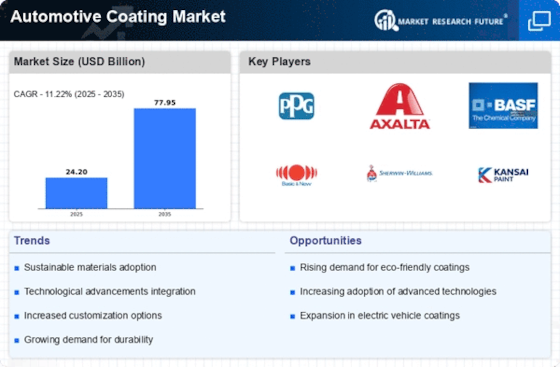Top Industry Leaders in the Automotive Coatings Market
 The automotive coating market is a dynamic landscape where innovation and competition are intertwined. Established giants vie for market share with nimble startups, all vying to cater to the evolving needs of automakers and car owners.
The automotive coating market is a dynamic landscape where innovation and competition are intertwined. Established giants vie for market share with nimble startups, all vying to cater to the evolving needs of automakers and car owners.
Strategies for Success:
-
Technological Prowess: Leading players like Axalta Coating Systems and PPG Industries are investing heavily in R&D, developing coatings with self-healing properties, scratch resistance, and enhanced durability. Recent advancements include BASF's waterborne coatings with low VOC emissions and AkzoNobel's self-healing clear coats. -
Sustainability Focus: Stringent environmental regulations are driving the adoption of eco-friendly coatings. Companies like Sherwin-Williams are offering waterborne and powder coatings with reduced environmental impact, while Nippon Paint is developing coatings made from recycled materials. -
Diversification and Specialization: To cater to diverse customer demands, companies are expanding their product portfolios. BASF, for example, offers a range of coatings for electric vehicles, while AkzoNobel focuses on high-performance coatings for luxury cars. -
Partnerships and Acquisitions: Strategic collaborations and acquisitions are accelerating innovation and market reach. Axalta's acquisition of Spradling helped them tap into the growing market for protective coatings for automotive interiors. -
Digitalization and Customer Service: The industry is embracing digital tools like AI-powered color matching and online ordering platforms to improve customer experience and streamline operations.
Factors Influencing Market Share:
-
Regional Growth: The Asia-Pacific region, led by China and India, is the fastest-growing market due to rising car production and increasing disposable income. Europe and North America remain mature markets but offer opportunities in specialty coatings and premium segments. -
Electric Vehicle Boom: The shift towards electric vehicles is impacting the coating market, with demand for lightweight and heat-resistant coatings increasing. Companies like PPG are developing coatings specifically for EV batteries and components. -
Regulatory Landscape: Stringent regulations on volatile organic compounds (VOCs) are pushing the market towards low-VOC and waterborne coatings. Companies are adapting their formulations and production processes to comply with environmental norms. -
Consumer Preferences: Customization and personalization are gaining traction, with car owners increasingly demanding unique colors and finishes. Companies are offering bespoke coating solutions to meet these demands.
Key Companies in the Automotive Coating market include
-
BASF SE (Germany)
-
Axalta Coating Systems (U.S.)
-
Kansai Paint Co., Ltd. (Japan)
-
Akzo Nobel N.V. (Netherlands)
-
Jotun (Norway)
-
Nippon Paint Holdings Co., Ltd. (Japan)
-
PPG Industries, Inc. (U.S.)
-
The Valspar Corporation (U.S.)
-
Arkema SA (France)
-
Berger Paints India Limited (India)
-
Clariant (Switzerland)
-
Koninklijke DSM N.V. (Netherlands)
-
Cabot Corporation (U.S.)
-
The Sherwin-Williams Company (U.S.)
-
Bayer AG (Germany).
Recent Developments:
October 2023: Digitalization gains momentum, with AI-powered solutions entering the automotive coating space.
November 2023: TotalEnergies converts feedstocks from plastic waste into circular polymers at its Texas plant, offering a potential solution for more sustainable automotive coating production.
January 2024: AkzoNobel highlights savings from using Intersleek 1100SR marine coating, demonstrating the potential for performance and sustainability benefits in automotive coatings.










